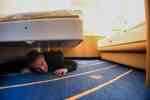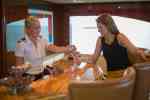Step 3 of 5•6 minutes read
Systematic Search
The acute stress that people experience during emergencies can result in behaviour that is not rational. This is a way of shielding from the strong experience of danger.

A guest in acute stress hiding. Photo: Viking Line
People can, for example, hide under beds or behind doors or sit in a corner in apathy without answering when spoken to. Searches must be carried out in a systematic way to ensure that all the relevant areas are searched so that nobody is left behind. The search technique that is best for a specific area is determined in drills onboard. Searched areas should be marked with masking tape or a label on the door.
Work in pairs when searching a smaller space, e.g. a ship's cabin. One person looks on and under the beds. The second search simultaneously the bathroom and behind the doors. When searching for a larger space, bigger than a cabin, you should also work in pairs. One person must always keep one hand on the wall as a reference point. Ensure that nobody is in the elevator when searching the adjoining areas.


When guests book their trip they are asked to state whether they have a disability, for example, impaired vision or hearing, if they use a wheelchair or have any other restrictions on mobility, take medicine, etc. The guests can also tell you if they need any kind of assistance onboard or to and from the yacht. In this way, the crew knows that there are people on board who need extra assistance during an emergency.
Children, parents and other family members who have been separated always try to seek each other out.
For everyone's safety, it is very important that the crew guides these people to muster stations or rescue stations where hopefully the missing family members are already waiting. Take action politely but very firmly in order to prevent people from continuing to look for each other. No person should go back to already searched areas. This can be fatal!